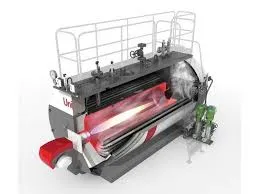
ធ្នូ . 13, 2024 13:36 Back to list
hot water boiler system
Hot Water Boiler Systems An Overview
In modern heating systems, hot water boilers play a crucial role in providing efficient and reliable heat for residential, commercial, and industrial applications. These systems function by heating water and distributing it through pipes to various parts of a building, ensuring a comfortable environment. The importance of hot water boiler systems cannot be overstated, as they contribute to our daily comfort and well-being. This article will delve into the functioning, types, benefits, and maintenance of hot water boiler systems.
How Hot Water Boilers Work
The primary function of a hot water boiler system is to convert fuel into heat, which is then transferred to water. The central component, the boiler, heats water using various energy sources such as natural gas, oil, electricity, or renewable resources like biomass. Once the water is warmed, it is circulated through pipes to radiators, underfloor heating systems, or other heating devices within the building.
Hot water can also be heated in combination with domestic hot water for showers and sinks, thus serving dual purposes. The system operates under pressure and is designed to maintain a consistent temperature by utilizing a thermostat that controls the boiler's operation.
Types of Hot Water Boilers
Hot water boilers come in several types, each suited for different applications and efficiency levels. The main types include
1. Fire-Tube Boilers In this design, hot gases pass through tubes submerged in water. The heat transfer is efficient, making these boilers robust and suitable for high-capacity heating needs. 2. Water-Tube Boilers These boilers circulate water through tubes that are heated by flue gases. They are often used in larger industrial applications due to their ability to generate steam at high pressures.
3. Combi Boilers A combination unit that provides both hot water and heating without the need for an additional hot water tank. This system is ideal for smaller homes or apartments.
4. Condensing Boilers These are high-efficiency units that utilize the heat from exhaust gases to preheat incoming water. They are environmentally friendly and minimize energy consumption.
Benefits of Hot Water Boiler Systems
The use of hot water boiler systems brings several key benefits
hot water boiler system

1. Efficiency Modern boilers can achieve high efficiency levels, reducing fuel consumption and lowering utility bills. Advances in technology, such as condensing boilers, maximize energy usage.
2. Comfort Hot water systems provide consistent and even heat, ensuring comfort in living and working spaces. The ability to set different temperatures in different rooms enhances this comfort.
3. Longevity With proper maintenance, hot water boilers can last significantly longer than other heating systems. Their durable construction often yields a lifespan exceeding 20 years.
4. Versatility Hot water boilers can be used in various applications, from residential heating to industrial processes, making them a versatile choice for many sectors.
5. Eco-Friendly Options With the availability of biomass and solar-powered options, hot water boilers can contribute to reduced carbon footprints, promoting environmental sustainability.
Maintenance and Safety
Regular maintenance is essential for ensuring the optimal performance and safety of hot water boiler systems. Key maintenance tasks include
- Routine Inspections Scheduled inspections help identify potential issues before they escalate into major problems. - Flushing the System Sediment can accumulate within the boiler; flushing it periodically helps maintain efficiency. - Checking Pressure and Temperature Regularly monitoring these levels ensures the system operates within safe parameters. - Bleeding Radiators This task removes trapped air, ensuring the system heats effectively.
Safety should never be compromised. It is important to install safety valves and backflow preventers to protect the system from excessive pressure and contamination.
Conclusion
Hot water boiler systems are vital components of modern heating infrastructure. Their efficiency, versatility, and reliability make them a popular choice for ensuring comfort in a variety of settings. With proper maintenance and care, these systems not only provide warmth and hot water but also contribute to energy savings and environmental sustainability. As technology continues to advance, we can expect to see even more efficient and eco-friendly hot water boiler systems in the future, enhancing our quality of life while minimizing environmental impact.
-
Efficient Biomass Fired Hot Water Boiler | AI Heating Solution
NewsAug.01,2025
-
High-Efficiency Gas Thermal Oil Boilers | HPT Models
NewsJul.31,2025
-
Oil Fired Hot Water Boilers Sale - High Efficiency & Affordable
NewsJul.31,2025
-
High-Efficiency Commercial Oil Fired Steam Boiler for Industry
NewsJul.30,2025
-
High-Efficiency Biomass Fired Thermal Oil Boiler Solutions
NewsJul.30,2025
-
High Efficiency Gas Fired Thermal Oil Boiler for Industrial Heating
NewsJul.29,2025
Related PRODUCTS






















